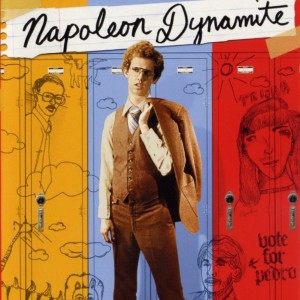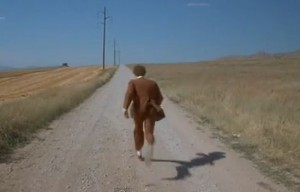100 Film Favorites – #51: “Napoleon Dynamite”
(Jared and Jerusha Hess, 2004)
It’s possible many of you just groaned audibly upon reading the title of today’s selection. Of all the films on this Countdown, this is the one I’ve heard the largest amount of vocal detestation for. A surprising number of people seem to vehemently hate this movie. I’ll do my best to explain why I don’t. I’m not expecting to win any converts, but rather, as with the other posts in this list, to highlight some of the elements of the film which make it a favorite of mine.
Napoleon Dynamite was an independent production, and the first feature-length film by husband-and-wife duo Jared and Jerusha Hess. The movie is adapted and expanded from Jared’s short film Peluca, which he created while a student at Brigham Young University. Both films take place in Hess’ home town of Preston, Idaho.
The feature adaptation stars cinematic newcomer Jon Heder as the titular character, Napoleon Dynamite (precisely why he has such a ridiculous name is never explained, nor shown to be thought of as odd by the other characters). Napoleon is a bizarre high school geek who lives with his 32-year-old brother in their grandmother’s house. Napoleon spends his days doing “whatever I feel like. Gosh!” This includes doodling pictures of legendary creatures and real hybrid animals such as ligers, dragging around an action figure on a string from the back of a school bus, and practicing sweet hip-hop dance moves.
One day, the Dynamite brothers’ adventurous grandma breaks her hip while out riding ATVs. Concerned that Napoleon and Kip (who spends all day “chatting online with babes”) will be unable to take care of themselves, Grandma calls in the assistance of their Uncle Rico. Rico, a washed-up middle-aged man living in a campervan, turns out to be just as immature as the “boys.” Rico longs for the lost glory of his football-playing days in high school, to the point that he purchases an alleged “time machine” on eBay in hopes of returning to that fleeting period. Over the following weeks, Rico proceeds to seriously cramp Napoleon’s style.
The predominant “arc” in the film deals with the friendships Napoleon establishes with Pedro, a Mexican exchange student at the high school, and Deb, a shy girl who attempts numerous odd-jobs to raise money for college. Late in the film, Napoleon assists Pedro in his bid for the student presidency. Though candidate Summer Wheatley, a popular and attractive girl, seems to have the election in the bag, Napoleon busts out a phenomenal dance routine at an assembly, thoroughly impressing the student body and convincing them to “Vote for Pedro.”
As in The Sandlot, and perhaps even more so in this case, Napoleon Dynamite is a film more concerned with presenting a series of quirky vignettes than a traditionally-structured narrative arc. Though it does have “a story,” more of the essence of the film lies in the bits and pieces we see of the daily lives of Napoleon, Kip, Rico, and Pedro, ranging from the surreal, to the probably imagined, to the downright mundane. Napoleon feeds his pet llama. Kip and Rico attempt a career as door-to-door Tupperware salesmen. Pedro feels very hot and decides to shave his head “because I realized it was my hair making my head hot.”
The fragmented feeling that these “blurbs” give the film contributes to what I feel are some of the film’s key themes: isolation and the nature of failure.
Many of the characters in the film are isolated in some way. The town of Preston itself seems to be the proverbial middle of nowhere, replete with dusty roads and broad, featureless fields. Napoleon’s hobbies are primarily solitary pursuits. Kip spends all his time on the internet, and Rico feels forgotten by the world and displaced from “his” time. It would be easy to make “Napoleon Dynamite” a much bleaker story than it is. These characters, and particularly Kip and Rico, would be considered by many people to be “failures” with few outstanding qualities and little chance of “success.”
And yet, the film suggests we should re-evaluate our definition of a “failure.” The most frequent complaint I’ve heard aimed at this movie is that Napoleon is an unlikeable protagonist. Well, that’s kind of the point. Napoleon concisely expresses his personal mantra when he advises a classmate, “Follow your heart. That’s what I do.” Napoleon accepts himself, and is very in-tune with his passions, unconcerned as to what others might think. While socially “adept” behavior necessitates carefully vetting our actions with regard to the opinions and reactions of others, Napoleon finds a kind of success by freeing himself from this stricture. He does what he feels, pursues his interests with dedication, and is genuinely himself every moment of the day. Yes, he’s weird. Yes, he does things that don’t “make sense.” But before you are too quick to label such a person “unlikeable,” consider: Is it because you are afraid to break free in a similar fashion? Does the judgment of others, and the fear of that judgment , keep you from really being you?
The story ends happily for our merry band of “failures.” Pedro wins the election. Kip’s internet girlfriend Lafawnduh turns out to be real, and the two meet and marry IRL. Grandma’s hip heals, and Deb joins Napoleon in a game of tetherball.
While it may not be Best Picture material, Napoleon Dynamite features memorable dialogue and characters, plenty of quirky scenarios, and an interesting peek into one surreal corner of “geek life.” The movie may not be your cup of tea, and that’s fine. But, in parting, I’d like to repeat once more the mantra I’ve tried to adopt in my own life. Maybe it’ll be of some use to you, too:
Follow your heart. That’s what I do.
—
Brian Terrill is the host of television show Count Gauntly’s Horrors from the Public Domain. You can keep up with Brian’s 100 Film Favorites countdown here.












